Your donation will support the student journalists of Francis Howell North High School. Your contribution will allow us to purchase equipment and cover our annual website hosting costs.
Finding Your Way
Published: October 1, 2018
Life is constantly throwing challenges and obstacles in our path. They are unavoidable, but not impossible to overcome. When facing these problems, a positive mindset can be a great asset. This In-depth explores its role in various challenges faced by people in the FHN Community.
(Design by Heeral Patel, Photos by Phoebe Primeau, Paige Westermann and Jordan Milewczik)
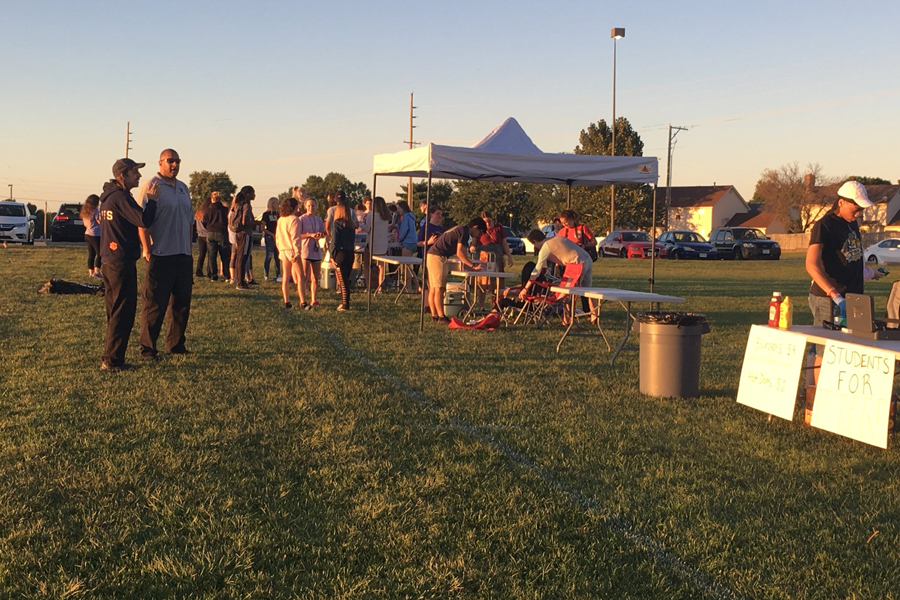
Community members were invited to a community movie “knight” on Sept. 22. Students at FHN came up with the idea to have stronger ties in the school community and the community that surrounds it. (Image from @FHN_Principal on Twitter)
FHN Administration Uses a New Sense of Community and a Positive Mindset to Build an FHN Community
Moving Towards Community
The administration at FHN entered the new school year keeping a couple key virtues in mind: trust and optimism, believing that these values can bring the school together as a more positive community.
Last year, FHN experienced an extreme number of fights, an unexpected intruder drill and other significant concerns about safety and the school environment as a whole. Assistant Principal Erin Steep believes that all these challenges caused an underlying issue to surface.
If I’m going to Cincinnati, I know the direction I’m headed. That’s what optimism is. It’s saying ‘Okay. That way. Things are getting better, and that’s the way we go.’ If there’s no sense of optimism, people just kind of sit around. They don’t move forward. That optimism can go a long way toward setting a tone and giving a sense of direction, and that direction is what matters.
— Nathan Hostetler
“Our root issue was a tone of negativity,” Steep said. “I think [Head Principal Nathan] Hostetler believes that everyone has good intentions and innate dignity, and I think we lost sight of that last year. The challenges that arose may not have been worse than we have seen in past years, but the talk was just way more negative.”
In order to correct this tone of negativity, the administration focused first on trust. Mutual trust is an extremely important value to the administration team, whether it be between staff and administration, students and staff or administration and students. They believe that trust and transparency are what will help the school move on from last year.
“I think the approach we have taken so far this year is very transparent and very open,” Steep said. “We haven’t tried to pretend that everything was great last year. We’ve put it on the table, saying that we know we’ve struggled, and we know that there was a lack of trust there, and we’re being really open about needing to rebuild that.”
The administration believes that optimism is an important part to set a more positive tone in the FHN Community. Hostetler believes that optimism is a roadmap to a brighter and better future. He describes optimism as a jolt to get the school on the right path.
“If I’m going to Cincinnati, I know the direction I’m headed,” Hostetler said. “That’s what optimism is. It’s saying ‘Okay. That way. Things are getting better, and that’s the way we go.’ If there’s no sense of optimism, people just kind of sit around. They don’t move forward. That optimism can go a long way toward setting a tone and giving a sense of direction, and that direction is what matters.”
Positivity is what the administration team is working towards this school year, believing that trust and optimism can help restore a positive atmosphere. Associate Principal Katie Greer thinks that a new, positive climate has helped the school move towards a more lively and exciting place for students to receive an education.
“Hope has come back,” Greer said. “It’s really easy when you’re upset to find everything that’s terrible, but when you’re happy, you’re going to find things that are positive.”
The administrators and staff have been working since July to help improve FHN, and this new motto of “FHN Community” has nestled its way into the minds of students and staff. Not only is the administration team determined to continue their success by hosting community movie nights and coffee with the principals, but they also think that this very idea of community allows for widespread acceptance and progress.
“A community is a place where everybody’s story matters,” Hostetler said. “Where the kid who was born and bred in St. Charles has a story that matters. Where the kid who has been chased across the globe for geopolitical reasons has a story that matters. Where the kid who is struggling with whether or not to come out of the closet has a story that matters. Where everybody can step past male and female, white and black, gay or straight, and we can say that we are all human beings who have stories that matter. That’s a community.”
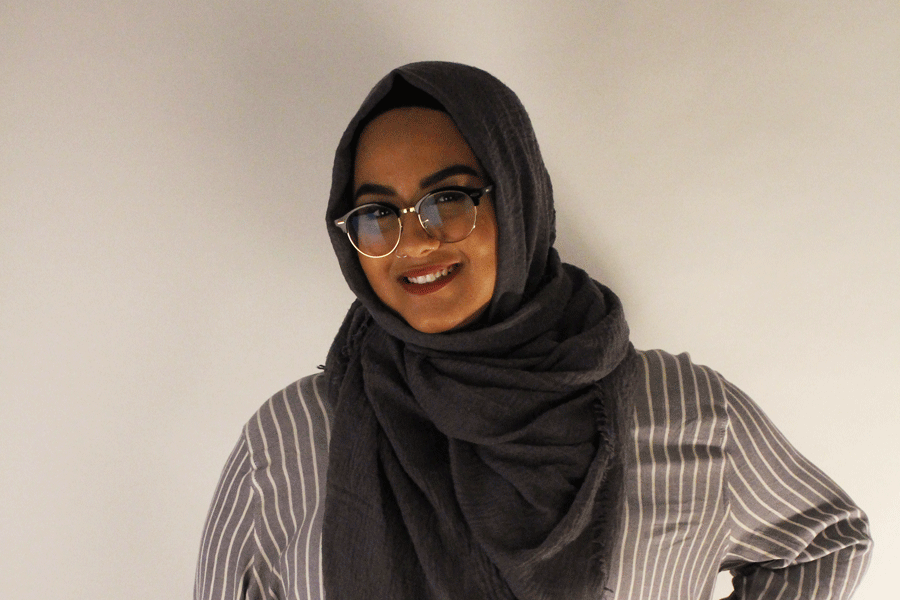
Credit to Jordan Milewczik
Junior Salam Abouchleih opens up about growing up in Saudi Arabia, her immigration to the US, being discriminated against and experiencing cross-culturalism.
Junior Salam Abouchleih Overcomes the Hardships Following Immigration, Discrimination and Cross-Culturalism
Peace, Prejudice and Positivity
Salam.
Five letters, one meaning: peace.
Yet, her life had been anything but.
The Middle East
The first scream echoed through the halls of her Saudi Arabian school. She ran. Sprinting as fast as an 8-year-old child could, she raced for any exit she could find as the shooter entered the building. Everyone was on their own. Heart racing, tears streaming down her face, it was all about survival, her survival. Yet, if she died, she felt it’d mean nothing. She was just another Palestinian.
It would only be her first school shooting of three, even with her school being one of the most prestigious in the area. That said, even with the fear and threat of violence, she was still living a life of luxury compared to her the rest of her family. Before her, her father had endured child labor and been shot at for fun. Yet before even him, her grandfather walked barefoot from Palestine to Jordan, as bombs dropped around him, to escape the war and return to the family he had already saved. With such great family sacrifices and struggle, junior Salam Abouchleih knew only to be grateful for her life in Saudi Arabia.
With so much movement, Salam has very culturally diverse roots. She is a Palestinian girl, raised in Saudi Arabia. Her father is from Lebanon. Her mother is from Saudi Arabia. Her grandparents are from Palestine but moved through Jordan, displacing her family.
This first time was in 1948 when Salam’s grandparents fled Palestine to escape the Arab-Israeli War. This war resulted from the Arabs rejecting the UN Partition Plan to split Palestine into two states, one Jewish and one Arab, to decrease conflict over who was to occupy specific land. After the Arabs rejected the plan, riots, bombings and massacres began and escalated to a full war, leaving over 720,000 Palestinian refugees.
After decades of conflict since, there are still hundreds of thousands of Palestinian refugees, many enduring severe poverty, racial discrimination and rampant unemployment in refugee camps. Yet, while the refugees struggle on, the conflict is still unresolved, with Israelis and Palestinians unable to come to an agreement on the land.
“[Palestinians] don’t care where you are from,” Salam said. “Just don’t treat us like we are dogs. We are literally treated like we are animals everywhere, everywhere we go. The thing that hurts the most is that wherever we go, we’re never going to have a country. We are never going to fit in, and that breaks my heart. My kids, when they grow up, they are never going to have a place to call home, ever.”
Coming to America
Living in a world of prejudice, Salam and her family couldn’t stay in Saudi. At age 12, Salam, her mother and her two brothers moved to the United States, leaving their father behind. He had sent them to the U.S. for a better life, staying back to work until he could join them two years later.
Even though she lives in a new house, Salam still feels like she has no home. No home country to identify at least; yet she could identify with many. With so many cultures clashing in her history, Salam cannot choose one. However, she knows she is a Middle Eastern woman and a Muslim. Constants within a world of shifting cultures, identities, countries and ideals.
While crucial to escape the injustices in the Middle East, the largest shift- moving to the the United States from Saudi- was no breeze. Moving to the U.S. meant leaving everything Salam knew and almost everyone she loved. To make matters more difficult, she felt invisible with Palestine still not recognized by the United States. She began to lose her identity. She lied about not being Palestinian to fit in. She avoided speaking Arabic. She just wished she was a white-skinned, blonde-haired, blue-eyed American girl.
Yet, she knew she had to stay positive about her situation. She still had a life beyond compare to many others, even with the hardship of her journey.
“My mom left everything,” Salam said. “She sacrificed her life for us, and I’m so thankful. They want you to have a better life, so they leave everything behind. Immigrant parents leave everything for you. My mom left her family, her sister, her mom, her dad when he was sick. She left him to come over here for us so we could have a better life. She left everything for us.”
Leaving everything behind makes for a hard transition to a new life. For Salam, it meant learning a new culture and educational system, making new friends and connections and overcoming discrimination and prejudice. She had to transition from a school of 450 people who spoke the same language to a school of 1,700 people speaking a second language. Not to mention shifting from an environment with terror to one where she was called a terrorist. It was a new world in the U.S.
“The first thing people think when they see me is that I’m dangerous or that I don’t like to have fun or that I’m very close-minded or don’t know what I’m talking about,” Salam said. “A lot of people think that I’m dangerous, and that really bothers me because I’m the opposite of that. I love peace. My name actually means peace in Arabic.”
False stereotyping, perceptions and terrorist “jokes” are not the only challenges Salam and her family face. Although they were able to immigrate to the U.S., Salam’s father still helps provide for his family overseas in the Middle East, causing him to send half his income away. Regardless, Salam still maintains a positive attitude and hopes to spread her enthusiastic, grateful mentality.
“Think about the people in the world that don’t have the opportunity to have anything or have never had anything. Be thankful for everything you have and be optimistic, because there are kids that have never even had the opportunity to have education in general.”
Moving Forward
Not only does Salam stay grateful, but she also focuses attention on her peers and their experiences, aspiring to negate the harsh words they hear from others by spreading hope and building connections among those with similar backgrounds.
“[Her positivity] helps her personally, but I think that helped her be successful at school and hopefully also successful in life,” ESOL teacher Anne Freeman said. “She’s caring, she’s a leader, she’s passionate and she’s very vocal in a positive way…I think other students look up to her because she’s full gold. She’s passionate. She is successful. I think others look up to her in that way.”
Whether leading by optimism or leading by example, Salam inspires not only her classmates, but her nearest friends. Willing to speak out about her stories or on injustices to Palestinian people by attending protests, Salam works to connect and bond to those around her. To further connect with others, she even helped begin the Delta Club, which is a club that embraces diversity of all kinds.
“There’s a lot of kids in our school like Salam who don’t get to share their stories for many different reasons,” fellow immigrant and friend Adriana Jimenez said. “So I think it’s very important for people to listen to her. It’s a very inspiring story that a lot of us need to listen to because a lot of things have happened to her that none of us would even think of, you know, happening to us. So the fact that she’s gone through it, we need to respect that, and we need to acknowledge it.”
Connecting with students like her in the United States, both through the Delta Club and in conversation, is how she’s able to overcome adversity and shift perspectives towards positivity and spread change.
“There’s a lot of Syrian refugees that I’ve been seeing for the past days, and it breaks my heart because I know what they feel like,” Salam said. “I know what it feels like to be Arab and Middle Eastern to be rejected… I know what they feel like, so I want to help them.”
Trying to aid other students, refugees and people by sharing her story and learning others’ stories, Salam continues to spread a positive outlook and promising initiative for change, all while remembering her roots along the way.
“I’m just so thankful that my dad had the opportunity to become an American citizen and has had the opportunity to bring us here and start a better life for us,” Salam said. “If he never did that, I would still be in Saudi Arabia, still getting discriminated against, and now that I’m older, I would have no no rights at all. Even now [in the United States], we’re still really lucky because there’s a lot of refugees who moved here to America, and they live in really, really bad areas… I just thank God every single day for the position that I’m in because I am so lucky compared to my family, or compared to the Palestinian refugees all over the world. I’m so so lucky.”
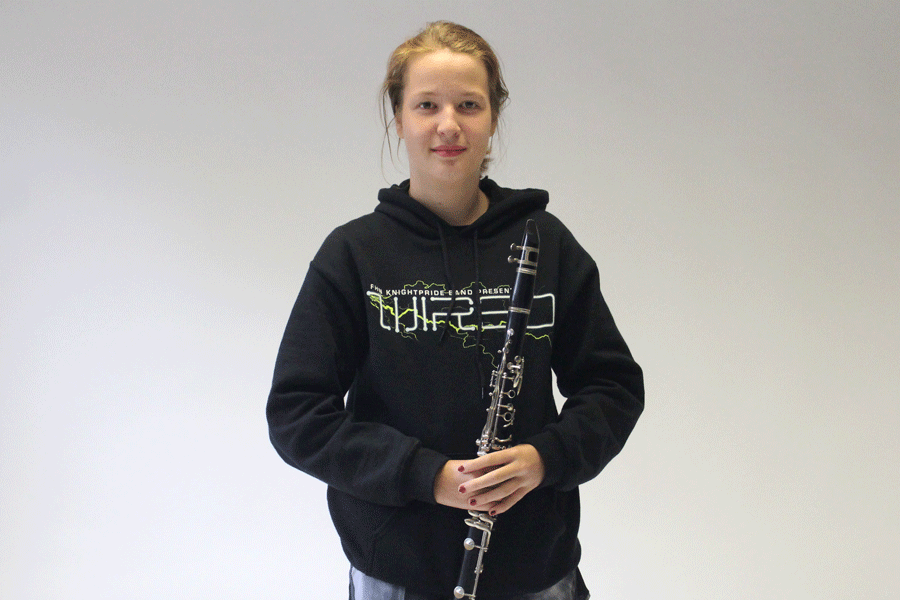
Credit to Jordan Milewczik
Sophomore Catherine Pundmann poses with her clarinet. After struggling with music, she improved by putting in extra time and effort.
After Struggling with Music, Sophomore Catherine Pundmann Improved Her Skill
After Struggling with Music, Sophomore Catherine Pundmann Improved Her Skill Through Putting in Extra Time and Effort
It’s freshman year. Music fills the ears of sophomore Catherine Pundmann. She looks around at everyone else, trying to mimic what they’re doing with their instruments. Pundmann struggles to catch up with the rest of the Woodwind Choir. Her range is off, and it’s already too far into the song to try to read the music and catch up. Overwhelmed and over it, she’s forced to sit and listen.
“I felt like everyone else around me was so good,” Pundmann said. “They could read all of the ink on the page, and I’m sitting over here barely being able to play a simple note.”
Pundmann is a clarinet player. During her freshman year, she joined Woodwind Choir and Basketball Band. She went through not feeling good about her place in band, and felt that everyone around her was on a completely different level of understanding music, especially with knowing how to read music.
“In a program like band, there’s a spectrum,” Band Director Robert Stegeman said. “Catherine came to band a little behind. I don’t think it’s anybody’s fault. But she is very determined and very focused when she’s in rehearsal. Her musical understanding got a lot better from when she started.”
By simply joining Marching Band, she bonded with a larger community of people. She fit extra practices into her schedule and worked hard to become the clarinet player she is now. Not only has she become comfortable at playing the clarinet, but she feels she’s found a home in her section.
“The more I saw her in Woodwind Choir, the more I saw her improve,” Arianna Chaves, senior and clarinet section leader, said. “Then she joined Marching Band, and things were hard at first, but the biggest thing she did is keep working at it and practicing. We were working together on a lot of things, and she has gotten so much better.”
Currently she’s in Marching Band, Woodwind Choir and Basketball Band, where she plans to stay and hopes that she can improve even more over time with help from the resources around her.
“When you’re in band, there are so many good people near you that you’re so motivated,” Pundmann said. “Whether you realize you do it or not, you pick up little things other members do when they rehearse of perform.”
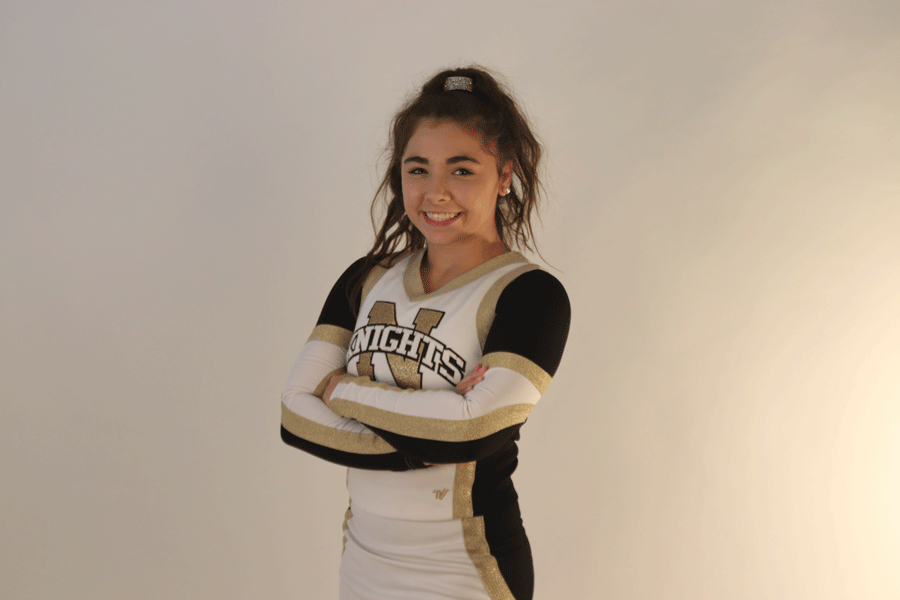
Credit to Paige Westermann
Morghen Fisher has been a cheerleader throughout her four years of high school. While cheering, she suffers from back pain, but still persists for her love of cheering.
Senior Morghen Fisher Regularly Battles Back Pain While Cheering
Senior Morghen Fisher Regularly Battles Back Pain While Cheering, Yet She Still Persists in Her Passion
It’s a daily procedure for Morghen Fisher and her team. Roll out the mats. Stretch. Warm up. The time is spent practicing stunts and doing routines. They’re filling, twisting, rolling and jumping. Perfecting their moves for performances. Now a senior, Fisher has been doing this for the past four years. She doesn’t feel it yet, but she knows the pain will come. It will feel like a pinch around those two points in her spine. Some tightness in her mid and lower back.
Fisher spends the time after cheer practice to rest and mend herself. Take ibuprofen to remove swelling. Use heating pads loosen up the muscles. Treat her back to keep it from getting worse. It’s a daily procedure for her.
“[The pain] kind of defeats you a little bit, because you know that it’s there, and you know that it’s causing you pain,” Fisher said. “But at the same time you know you have to push through for your team. It kind of motivates you and defeats you at the same time. It didn’t hurt as much during practice, but after practice is when it would start hurting.”
Knowing she will have to go through it all again the next day demotivates her further.
“She won’t stop doing it even though it hurts. She won’t stop doing it because it’s something that she loves doing, and when there’s something you love doing, you’re going to do it as much as you possibly can. It’s like that with any other athlete.
— Varsity Head Coach Tracy Wuertenberg
Fisher began her cheering in the sixth grade at a friend’s gym. Through practicing their skills everyday, being on a competitive cheer team and helping with a program that taught girls with disabilities cheer, Fisher and the other cheerleaders in her gym grew closer. For her, friendship and cheer go hand-in-hand. It’s through cheer that she’s made her best friends, and it’s through her friends’ encouragement that she gets the extra motivation to push through the pain on a daily basis.
“I see someone who has a lot of passion for what she did, and when times started getting hard for her, I had to just keep letting her know that it’s okay and that she can force through the pain and she was stronger than her mind would let her believe,” her best friend, senior Katie Von Harz said. ”It’s definitely upsetting because it does cause some limits on her, and it does affect the things that she loves to do the most. [However,] I always know that she’s strong enough to get through it.”
It was actually a problem in her neck that led Fisher to seeing a chiropractor during her sophomore year. There they took x-rays and found the cause of the back pain that plagued Fisher since she started cheering: her back was curved at two points. One in the mid back and the other in the lower. It wasn’t so much that she needed surgery, but enough to cause discomfort after exercise. Finally Fisher knew that the problems she had been experiencing had a reason. She had scoliosis.
“[Pain] wasn’t something that stopped me before,” Fisher said. “It didn’t really faze me much that I knew I had [scoliosis] because it didn’t affect me then. I didn’t want to change anything because I found out a name for what it was.”
She isn’t afraid of getting a major injury. Doctors haven’t given orders that limit her abilities; the pain however does. Scoliosis doesn’t increase her chances of getting injured, but when it starts to hurt, Fisher knows she needs to ease up. It will hurt to move. It will make it hard to lift other cheerleaders sometimes. Her battle with the pain is an ongoing ebb and flow. Some days are worse than others, but she still pushes through.
“She won’t stop doing it even though it hurts,” varsity Head Coach Tracy Wuertenberg said. “She won’t stop doing it because it’s something that she loves doing, and when there’s something you love doing, you’re going to do it as much as you possibly can. It’s like that with any other athlete.”
At the end of the day, Fisher goes back for her team. Giving up on the sport would be giving up on them. She helps her team, and they support her. The pain in her back makes cheering a little harder for her, but not impossible.
“They don’t let me get down on myself,” Fisher said. “If I don’t feel like I’m doing something to my full capability, they help me by letting me know that it’s okay and that I’m doing the best I can. I think it would be little harder [without them] because I am mentally hard on myself, so without those people around me, it would be a big challenge because I would be thinking that I can’t do things that I can.”
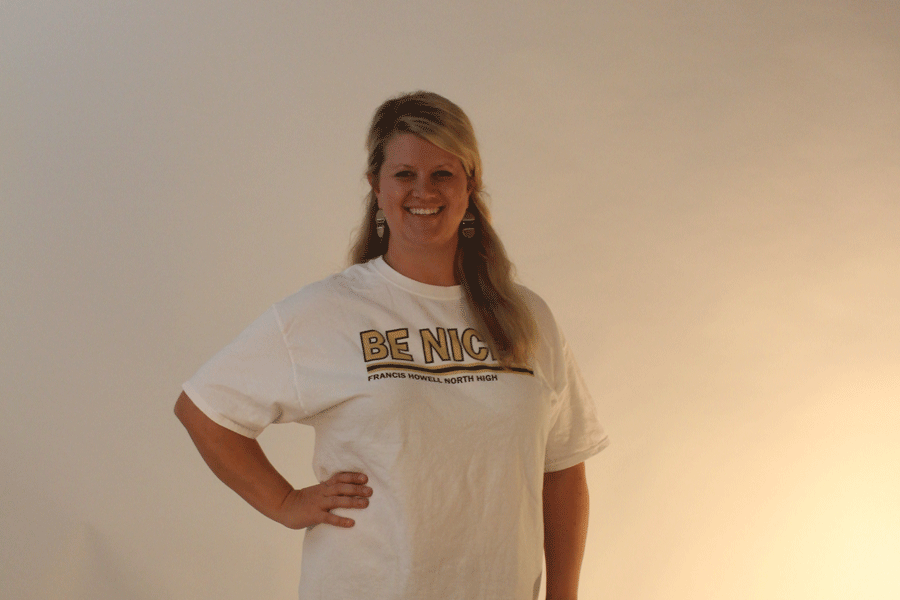
Credit to Phoebe Primeau
In the 2016-17 school year, English teacher Jani Wilkens took a leave of absence after she developed debilitating panic attacks. Wilkens continues to keep a positive outlook in life after looking back at how she changed during her leave of absence.
English Teacher Jani Wilkens Keeps a Positive Outlook While Dealing with Panic Attacks and Seasonal Depression
She woke up in the morning and started to get ready for the school day. She headed to the shower, when suddenly on overwhelming sense of panic consumed her. Her heart started racing and her breath was shallow. ‘What is going on?’ She stumbled into the bathroom, crying and threw up. Confused and upset, English teacher Jani Wilkens wondered what’s happening and why is she not able to power through it.
During the 2016-17 school year, Wilkens took a leave of absence lasting from October through December due to debilitating panic attacks that kept her from being able to come into work.
“I’ve been able to look at it pretty clearly,” Wilkens said. “When I’m in a good place, I get a lot of clarity about it. So, I can easily say now that there were a lot of warning signs that I wasn’t paying attention to in my body. I would get stressed more easily. I wanted to sleep a lot as opposed to doing things. I would get kind of edgy and short with the people that I love like my family and kids. When it’s something that could dramatically affect me, I was pretending it wasn’t happening. I don’t think I realized how bad it was until the panic attacks started.”
Wilkens has suffered from seasonal depression since her junior year of high school. This makes it more difficult for Wilkens to cope during the darker times of the year like fall and winter. She would try to stay busy, which resulted in more stress and panic.
“I really tried to hide [my attacks] from my kids,” Wilkens said. “I didn’t want them to see that I was a mess. So I would call in sick, and it got to be a thing where that same feeling of tension and of my heart racing and feeling like I was being squeezed. But it got to the point where I was missing enough work that I was feeling even worse about it because it’s really important to me that I don’t let people down.”
After calling in sick multiple times, Wilkens decided to take a short-term leave of absence through disability due to mental illness. She started her path to healing by seeing a therapist through her church two times a week and going to a doctor. The hardest part for her was admitting that she needed help.
“I’ve always bitten my fingernails. Recently, I was listening to one of her podcasts that was about stop telling yourself promises that you’re not going to keep. And so I said, ‘I want pretty nails and I have the power to have nice nails, so stop biting them.’ It’s that simple.
— Jani Wilkens
“When you’re already in a bad place, it takes an enormous amount of strength to even make the call to make an appointment because you’re admitting,” Wilkens said. “You’re admitting ‘I can’t do this by myself, and I’m going to need someone to help me. I can’t get out of this by myself,’ which is really hard.”
Two months went by and it was the start of a new semester; Wilkens returned to her classroom, as ready as she would ever be for the start of the last half of the year. She came back with a lot of encouragement from her colleagues, who even went to her room and prayed with her.
“When she was out, I tried my hardest to make sure she did not have things to think about,” Shelly Parks, English teacher and friend, said. “I remember going up to her room the first morning that she came back and I just sat at the desk and held her hands and prayed. I wanted her to know that we were for sure supporting her but there was somebody who was much greater than us who had her back.”
With all of the love that she was feeling, she still felt guilty about taking leave. While she knows that she had to take care of herself, it was still difficult to do so when she wanted to take care of others.
“The hardest part about coming back was knowing that I had let people down by being gone and, even though my students were very kind, especially when I was willing to share a little bit of why I was gone with them, I knew that I had let people down,” Wilkens said. “I had to own up to it, and I didn’t want to. That’s still in the back of my mind a lot, the people who were in my class that I felt like I really let down, like maybe I could’ve given more of an effort to them. But that was all I had to give, and I have to be okay with that.”
While she was doing better last year, Wilkens learned of the unexpected passing of her brother-in-law in Boston. So, she dropped everything at work and went to help her sister with anything she needed. Wilkens took over just about everything, resulting in a lot of emotional and mental stress.
“I got home around midnight on Wednesday night, and I was going to come back to work on Thursday, but I don’t think I made it back to work until Monday,” Wilkens said. “Part of it was I just slammed into the ground emotionally. I was scared, I was scared that it was all going to come back, all the panic. I had all of these great kids here in my classroom who I wanted to be there for, and I said ‘Nope, I need to get this together before I get back there.’ I feel like even last year, I want to say I was treading water, but I think I was doing better than treading water, more like a doggy paddle.”
With the help from her friend and Bible study group member Heather Brewer, Wilkens was able to express her thoughts and feelings about her trip to Boston to another person, rather than bottle it up inside.
“She is very real with it,” Brewer said. “She’s able to see that if she’s vulnerable with it, it helps others and it helps her, too. She doesn’t have to pretend. She can be honest with her feelings. She’s very realistic and I think she’s grown so much in realizing that every person has their own individual journey. It gives her outlook on how people struggle and just because you may or may not understand it doesn’t make it any less real.”
Wilkens learned a lot about herself from this experience. With the help of her colleagues, her family and friends, her therapist and the people at her church, Wilkens was able to grow as a mother, teacher, friend and person.
“I think I’ve come out on the other side and realize that I can’t please everyone,” Wilkens said. “And even though I want to please everyone, because I feel like I should be able to, it’s okay if I don’t. I am who I am. If people don’t love me or appreciate me for who I am, then I might be better off without those people in my life, which has meant I’ve had to say goodbye to some things.”
She makes sure to keep up with her self-care and to keep an eye on her mental health. One of the things that she likes to do is to read different books about a variety of topics. One thing she learned from her one of her favorite authors Rachel Hollis was to set reasonable goals for herself and to stop promising herself things that she wouldn’t promise to her best friend. She found this beneficial because she was able to set smaller, more attainable goals and achieve them, without feeling as stressed. With that in mind, Wilkens was able to accomplish a life-long goal: growing out her fingernails.
“I’ve always bitten my fingernails,” Wilkens said. “Recently, I was listening to one of her podcasts that was about stop telling yourself promises that you’re not going to keep. And so I said, ‘I want pretty nails and I have the power to have nice nails, so stop biting them.’ It’s that simple.”
Looking back, Wilkens is able to see all the ways in which she has changed for the better. Her goal is to help those who may be feeling what she felt, by listening and supporting anyone and everyone.
“I think if you’re in the middle of it, you have to reach out for help,” Wilkens said. “And that is not an easy task. Because the minute you reach out for help, or admit that something’s not going the way you would like it to be in your life, you are admitting that you can’t fix it yourself. That’s really hard. I think that after you’ve gone through something, make it matter. I feel like I have to make it matter that I went through that. Maybe you make it matter by telling your story. Maybe you make it matter by helping someone else through a similar situation, because you get it. Maybe you make it matter by giving to others what you wish was given to you, or what was given to you, like kindness, or something that was helpful. You have to own your experience so that you can then turn and make it matter that you went through it.”



